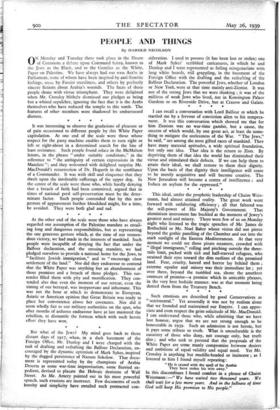But what of the Jews? My mind goes back to
those distant days of 1917, when, in a dark basement of the Foreign Office, Mr. Dunlop and I were charged with the task of drafting and redrafting the Balfour Declaration, en- couraged by the dynamic optimism of Mark Sykes, inspired by the dogged persistence of Naoum Sokolow. That docu- ment is represented today by the champions of Arabia Deserta as some war-time improvisation, some flurried ex- pedient, devised to placate the Hebraic denizens of Wall Street. As Mr. Amery pointed out in his most powerful speech, such evasions are incorrect. Few documents of such brevity and simplicity have entailed such protracted con- sideration. I used to possess (it has been lost or stolen) one of Mark Sykes' scribbled caricatures, in which he and Dunlop and I were represented as failing octogenarians with long white beards, still grappling, in the basement of the Foreign Office with the drafting and the redrafting of the Balfour Declaration. The powerful Jews, whether of London or New York, were at that time mainly anti-Zionist. It was not of the strong Jews that we were thinking ; it was of the millions of weak Jews who lived, not in Kensington Palace Gardens or on Riverside Drive, but at Cracow and Galatz.


























































 Previous page
Previous page